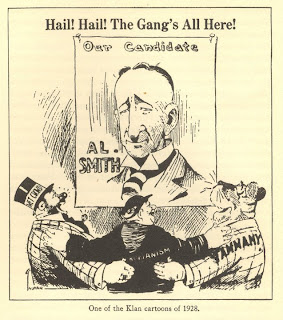“Is not your Church the only Church that does not demand moral character as a qualification for membership? Why is it that you allow drunkards, rum sellers, and boodlers to be members of your Church in good standing? Are they in the fellowship? Why are there so many wicked, poor, and ignorant in your Church?”
An habitual drunkard, a saloon-keeper whose saloon is a proximate occasion of sin to himself or others, a thief who is enjoying stolen property which he does not intend to restore— these are not members in good standing, for no unrepentant sinner is allowed to receive the sacraments in the Catholic Church. She, however, does not pretend to be a social club for the elite, the outwardly respectable or the well-to-do, for, like Christ, she is universal, with a message for sinner and saint, rich and poor, cultured and ignorant.
Christ came for sinners: “For the Son of Man is come to save that which was lost” (Matt. xviii. n). “Iam not come to call the just, but sinners” (Matt. ix. 13). He loved the poor and the ignorant, and John the Baptist was told to recognize ” the preaching of the Gospel to the poor” (Matt. xi. 5) as one of the signs of His Messiasship.
So the Church, Christ’s representative, never abandons the sinner, but, like another Christ, goes after the lost sheep that she may win them back to the fold. Her priesthood, her Mass, her sacraments, her devotions, her missions— all are for the sinner. She is the Church also of the poor, for at our altars all are equal—” all are one in Christ Jesus” (Gal. iii. 28).
I remember meeting a Unitarian minister from Vermont in Boston, last June, who told me that he was about to resign his ministry, because his efforts to reach out to the poor of his city had been met by the decided protest of the rich members of his fashionable congregation. The Church of God knows no such distinction. How false the notion of the Reformation, that the Church of the living God ought to be composed merely of the elect.
Such is not the teaching of Christ, as we learn from the parables of the cockle and the wheat (Matt. xiii. 24-30), the net of good and bad fish (xiii. 47), the flock of sheep and goats (xxv. 32), the house containing vessels of honor and vessels of dishonor (II. Tim. ii. 20). So shall it be until the harvest come, until the final eternal separation at the day of Judgment.
Rev. Bertrand L. Conway, C.S.P., The Question Box Answers: Replies to Questions Received on Missions to Non-Catholics (New York: The Catholic Book Exchange, 1903), 150-151.
NOTE
In 1858, Father Isaac T. Hecker founded the Paulist Fathers to evangelize America. This included lectures to non-Catholics. At Chicago’s Parliament of World Religions in 1893, the nation’s first major interfaith gathering, the Paulists started using the Question Box. Anyone could ask any questions about Catholicism. They later received some 250,000 questions from all parts of the country. By the late 1920’s, over two million copies of the book were in print.
A “boodler” refers to a corrupt politician. The above poster is taken from the 1928 presidential campaign of Alfred E. Smith, the first Catholic to run on a major paty’s ticket. It was a time of intense anti-Catholicism, as the poster denotes. The traditionally pro-Democrat Catholics were seen as fostering alcoholism through their opposition to Prohibition, and corrupt urban politics as well.












